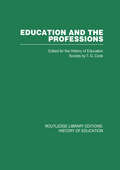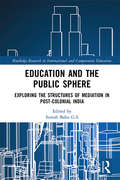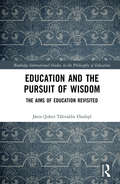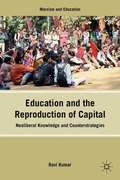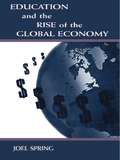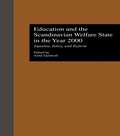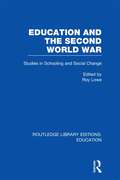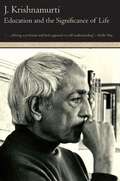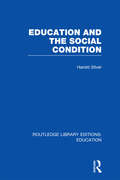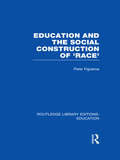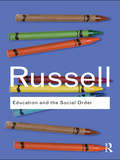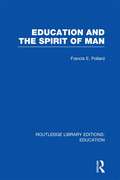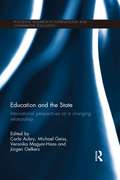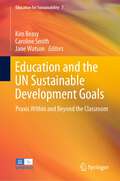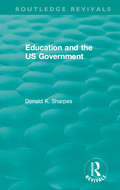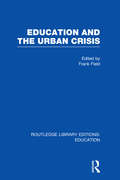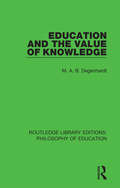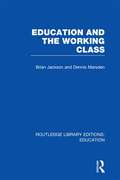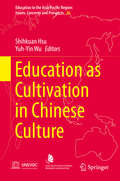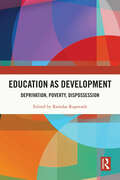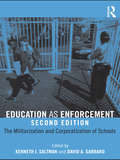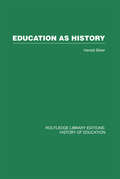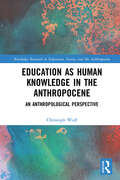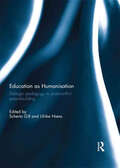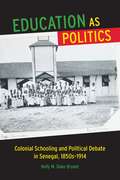- Table View
- List View
Education and the Professions
by History of Education SocietyPart of the educational system in England has been geared towards the preparation of particular professions, while the identity and status of members of some professions have depended significantly on the general education they have received. Originally published in 1973, this volume explores the interaction between education and the professions. It also looks at the education of the main professions in sixteenth century England and at how twentieth century university teaching is a key profession for the training of new recruits to other professions.
Education and the Public Sphere: Exploring the Structures of Mediation in Post-Colonial India (Routledge Research in International and Comparative Education)
by Suresh Babu G. S.Education and the Public Sphere conceptually and empirically investigates and unfolds several complexities embedded in the educational system in India by exploring it as a site of transforming the public sphere. Bringing together a range of contributions from education and the social sciences, this volume analyses and reflects on structures in education and how these mediate and transform the public sphere in post-colonial India. Drawing on fresh research, case studies and testimony, this book debates issues such as the crisis in higher education, privatisation and politicisation of education, the reciprocal relationship between marginalisation and education, and the lasting impact that modern pedagogical practices have on the wider world. It critically reflects on the direct engagement of people, institutions, various cultural sensibilities and public debate to animate how these combined structures affect the teaching and learning process. From a unique interdisciplinary perspective, this book initiates an analytical enquiry into teaching and the culture of learning, generating critical discourses on the system as a whole. This book will be vital reading for researchers, scholars and postgraduate students in the field of international education, education theory and social justice education.
Education and the Pursuit of Wisdom: The Aims of Education Revisited (Routledge International Studies in the Philosophy of Education)
by Jānis (John) OzoliņšEducation and the Pursuit of Wisdom examines the ways in which the timeless human search for wisdom relates to current educational practices. This book challenges the current approach of an economically-driven system preparing students solely for the workplace, and instead discusses the importance of teaching wisdom in order to enrich all aspects of the lives of students. Ozoliņš discusses how teaching young people how to make decisions will not only benefit them in everyday life, but will benefit society as a whole. Drawing on religious and classical texts such as Benedictine and Confucian works, Ozoliņš’ book assesses and re-evaluates the central aim of education, and moves toward developing a robust understanding of the value of wisdom and its implications. Alternative approaches to education and the ways in which educators can establish agency in this process are also carefully considered. Detailed, well-researched, and with an international scope, Education and the Pursuit of Wisdom is an ideal reference work for researchers, lecturers and postgraduate students of education, and in particular the philosophy of education and the concept of wisdom.
Education and the Reproduction of Capital
by Ravi KumarA reflection on the specific context of neoliberal capitalism and it's impact on education. The chapters establish the intersectionality of state, capital and education and engage with possibilities of transcending the onslaught of capital in different geographical locations - from the Northern Hemisphere to the Southern Hemisphere.
Education and the Rise of the Global Economy (Sociocultural, Political, and Historical Studies in Education)
by Joel SpringJoel Spring investigates the role of educational policy in the evolving global economy, and the consequences of school systems around the world adapting to meet the needs of international corporations. The new global model for education addresses problems of technological change, the quick exchange of capital, and free markets; policies to resolve these problems include "lifelong learning," "learning societies," international and national accreditation of work skills; international and national standards and tests; school choice; multiculturalism; and economic nationalism. The distinctive contribution Spring makes is to offer an original interpretive framework for examining and understanding the interconnections among education, imperialism and colonialism, and the rise of the global economy. He offers a unique comparison of the educational policies of the World Bank, the United Nations, the European Union, and the Organization for Economic Development and Cooperation. Additionally, he provides and weaves together important historical and current information on education in the context of the expansion of international capitalism; much of this information, gathered from many diverse sources, is otherwise not easily available to readers of this book. In the concluding chapters of the volume, Spring presents a thoughtful analysis and a powerful argument emphasizing the importance of human rights education in a global economy. This volume is a sequel to Spring's earlier book, Education and the Rise of the Corporate State (1972), continuing the work he has been engaged in since the 1970s to describe and analyze the relationship between political, economic, and historical forces and educational policy.
Education and the Scandinavian Welfare State in the Year 2000: Equality, Policy, and Reform (Reference Books in International Education #Vol. 39)
by Arild TjeldvollThis significant contribution to comparative education presents an authoritative discussion of the recent changes in Denmark, Finland, Iceland, Norway and Sweden. The implementation of a democratic educational policy in Scandinavia has been affected by the dominance of the Protestant Church, mass immigration from Third World nations, a growing belief in rugged individualism, newfound respect for privatization and the market economy, and the increasing unemployment of the technical revolution. Education has been unable to adapt rapidly enough to meet the changing needs of this transformed Scandinavia. In this comprehensive collection of articles, contributors present their findings, thoughts and concerns for the Scandinavia of both the 90s and the future.
Education and the Second World War: Studies in Schooling and Social Change (Routledge Library Editions: Education)
by Roy LoweThis was the first book which globally surveyed the impact of the Second World War on schooling. It offers fascinating comparisons of the impact of total war, both in terms of physical disruption and its effects on the ideology of schooling. By analysing the effects on the education systems of each of the participant nations the contributors throw new light on the responses made in different parts of the globe to the challenge of world-wide conflict.
Education and the Significance of Life
by Jiddu KrishnamurtiThe teacher probes the Western problems of conformity and loss of personal values while offering a fresh approach to self-understanding and the meaning of personal freedom and mature love.
Education and the Social Condition (Routledge Library Editions: Education)
by Harold SilverThis book reviews the educational experience of the 1960s and 1970s and to suggest ways of approaching major contemporary themes such as equality, accountability and standards. The author underlines a nineteenth and twentieth-century sociological tradition in analysing education and covers a range of educational themes including aspects of schooling and higher education, education as social policy, knowledge as power, and teaching and adolescence. He draws on the social history of many of the processes, concepts and debates. Parts of the book derive from research into the history and contemporary forms of these problems in the USA. The volume therefore illuminates important contemporary issues in education and society by using historical, sociological and comparative insights.
Education and the Social Construction of 'Race' (Routledge Library Editions: Education)
by Peter FigueroaDoes the education system help or hinder the fight against racism? This volume provides a constructive critique of the Swan Report of 1985 and of sociological research into racial and ethnic relations. The author undertakes a searching philosophical and sociological analysis of multicultural and antiracist education. He shows how the education system itself can reinforce racist assumptions and behaviour in society, but also argues that through educational and social reconstructing it can promote constructive cross-cultural relations.
Education and the Social Order
by Bertrand RussellBertrand Russell was renowned for his provocative views on education. Considered an educational innovator, Russell attempted to create the perfect learning institution. Despite the failure of this practical vision, it did not stop him from continuing to strive towards inventing and arguing for a system of education free from repression. In Education and the Social Order, Russell dissects the motives behind educational theory and practice, and in doing so lays out original and controversial arguments for the reformation of the education of the individual.
Education and the Spirit of Man (Routledge Library Editions: Education #151)
by Francis PollardThis volume was the Swarthmore Lecture for 1932, one of an annual series of lectures delivered by and for members of the Society of Friends (Quakers). The lecture discusses the place of education and moral philosophy in the world of the early twentieth century, as well as the place of religious discipline in education.
Education and the State: International perspectives on a changing relationship (Routledge Research in International and Comparative Education)
by Michael Geiss Carla Aubry Veronika Magyar-Haas Jürgen OelkersIn most countries in the world, school education is the business of the state. Even if forms and functions differ, the imparting of elementary knowledge is universally regarded as a public function. Yet this is neither self-evident nor self-explanatory. The degree of involvement of state agencies in the supervision, financing and organization of the school system sometimes varies so much that the usual assumption of a common understanding of ‘the state’ seems to be an illusion. Making international comparisons and focusing strongly on the historical conditions of the current form of state education, this volume paints a nuanced picture of how the relationship between ‘education’ and ‘state’ has been and is conceptualized. Insights into this relationship are gained by considering and analysing both specific processes such as financing and bureaucracy; and conceptual ideas, for example community, authority, and political utopias. The book presents comparative studies and analyses of regional and local conditions, arguing that the history of each country or region is critical to educational success, and the relationship between the education and the state must be reconsidered, both internationally and historically, in order to be of actual conceptual value. Education and the State presents a broad variety of approaches and examples that provide a significant contribution to the understanding of the relationship between education and the state. It will be of key value to academics and researchers in the fields of the history of education, the politics of education, and educational administration.
Education and the UN Sustainable Development Goals: Praxis Within and Beyond the Classroom (Education for Sustainability #7)
by Caroline Smith Jane Watson Kim BeasyThis book focuses on the complex relationship between education and the Sustainable Development Goals (SDGs) and highlights how important context is for both critiquing and achieving the Goals though education, given the critical role teachers, schools and curriculum play in young people’s lives. Readers will find examples of thinking and practice across the spectrum of education and training sectors, both formal and informal. The book adds to the increasing body of literature that recognises that education is, and must be, in its praxis, at the heart of all the SDGs. As we enter the third decade of the 21st century, we have a clear understanding of the wicked and complex crises regarding the health of life on our planet, and we cannot ignore the high levels of anxiety our young people are experiencing about their future. Continuing in the direction of unsustainable exploitation of people and nature is no longer an option if life is to have a flourishing future. The book illustrates how SDGs are supported in and by education and training, showcasing the conditions necessary to ensure SDGs are fore fronted in policy reform. It includes real-world examples of SDGs in education and training contexts, as well as novel critiques of the SDGs in regard to their privileging of anthropocentrism and neoliberalism. This book is beneficial to academics, researchers, post graduate and tertiary students from all fields relating to education and training. It is also of interest to policy developers from across disciplines and government agencies who are interested in how the SDGs relate to education.
Education and the US Government (Routledge Revivals)
by Donald K. SharpesOriginally published in 1987, at a time when central government control of education in many countries was growing rapidly, this book on the historical determinants of US educational legislation was of great relevance. The book looks in detail at the history of the relationship between the US Government and the provision of educational services. It assesses the contributions made to educational legislation by key political figures such as Franklin, Washington and Jefferson. The author also examines in depth the role of congress and the president, the relationship between the federal government and the state legislature and the role of the judiciary in education. An account of the hard-fought battle for the right to equal educational opportunities for the American Negro and the American Indian is of considerable interest. Finally, the book compares the American educational system at the time with that of other countries.
Education and the Urban Crisis (Routledge Library Editions: Education)
by Frank FieldBased on two conferences, this volume explores trends during the 1960s and 1970s in inner city areas in the United Kingdom. It describes how the inner city is losing jobs and skilled workers and, as the population falls, the number of disadvantaged people and those claiming benefits is increasing. To what extent, the book asks, does the educational system contribute to or alleviate Britain’s urban crisis? In answering this question, the contributors examine the complex interrelationships between educational, economic and social problems, and point out that one of the major weaknesses of the present educational system in Britain is that it is in no way linked to the labour market. They suggest how schools could be better linked to local employment opportunities while at the same time offering more culturally varied educational opportunities. They also analyze Britain’s urban programme and show that it in no way matches up to what is required if poverty – which is seen as the root of the urban crisis – is to be eradicated.
Education and the Value of Knowledge (Routledge Library Editions: Philosophy Of Education Ser. #7)
by M. A. DegenhardtIn this title, first published in 1982, the author deals with some of the all-important questions of curriculum justification such as ‘why do we value knowledge?’; ‘why is it that we value some kinds of knowledge more than others?’; ‘can we simply receive knowledge to be good, or is our belief that it is so grounded in man’s nature, or that of k
Education and the Working Class (Routledge Library Editions: Education #179)
by Brian Jackson Dennis MarsdenWhen first published this book had a significant influence on the campaign for comprehensive schools and it spoke to generations of working-class students who were either deterred by the class barriers erected by selective schools and elite universities, or, having broken through them to gain university entry, found themselves at sea. The authors admit at the end of the book they have raised and failed to answer many questions, and in spite of the disappearance of the majority of grammar schools, many of those questions still remain unanswered.
Education as Cultivation in Chinese Culture
by Shihkuan Hsu Yuh-Yin WuGiven the increasing global interest in Chinese culture, this book uses case studies to describe and interpret Chinese cultivation in contemporary Taiwanese schools. Cultivation is a concept unique to Chinese culture and is characterized by different attitudes towards teaching and learning compared to Western models of education. The book starts with a discussion of human nature in Chinese schools of philosophy and levels of goodness. Following the philosophical background is a presentation of how cultivation is practiced in Chinese culture from prenatal through high school education. The case studies focus both on how students are cultivated as they become members of Chinese society, and on what role teachers play in cultivating the children in school. In addition, supports from Chinese educational institutions, including public schools, families, and organizations such as private cram schools, are introduced and explained. In closing, the book presents a critique of the modern school reform movement and the conflicts between the reform proposals and traditional practices. Based on the collective work of Taiwanese researchers in the fields of education, history and anthropology, the book identifies the purpose of education as cultivating virtue in a process of creating an ideal person who serves society, and describes the way teachers have carried on this tradition despite its faltering status in contemporary educational discourse and in the face of reform movements.
Education as Development: Deprivation, Poverty, Dispossession
by Ramdas RupavathThis book is an in-depth analysis of the educational development of tribals in India. Education as Development: Deprivation, Poverty, Dispossession is a significant new addition for understanding educational and economic setbacks experienced by the marginalized in India. The volume:• Focuses on how the social, economic and education systems have evolved over time in India and identifies the scope of development in these areas;• Provides a rational structure for readers to understand how the Adivasi in India can be made to fit in the modern designed education system;• Highlights the problems of the marginalized – such as income inequality, education, health, housing, governance, civil society environment and infrastructure and others which hampers their overall growth. This book will be of great interest to students and researchers and policy makers in the fields of education, minority studies, indigenous studies, sociology of education, and South Asian studies.
Education as Enforcement: The Militarization and Corporatization of Schools
by Kenneth J. SaltmanThe first volume to focus on the intersections of militarization, corporations, and education, Education as Enforcement exposed the many ways schooling has become the means through which the expansion of global corporate power are enforced. Since publication of the first edition, these trends have increased to disturbing levels as a result of the extensive militarization of civil society, the implosion of the neoconservative movement, and the financial meltdown that radically called into question the basic assumptions undergirding neoliberal ideology. An understanding of the enforcement of these corporate economic imperatives remains imperative to a critical discussion of related militarized trends in schools, whether through accountability and standards, school security, or other discipline based reforms. Education as Enforcement elaborates upon the central arguments of the first edition and updates readers on how recent events have reinforced their continued original relevance. In addition to substantive updates to several original chapters, this second edition includes a new foreword by Henry Giroux, a new introduction, and four new chapters that reveal the most contemporary expressions of the militarization and corporatization of education. New topics covered in this collection include zero-tolerance, foreign and second language instruction in the post-9/11 context, the rise of single-sex classrooms, and the intersection of the militarization and corporatization of schools under the Obama administration.
Education as History
by Harold SilverOriginally published 1983.This book explores the nature of the social history of education. It examines what aspects of the history of education have been neglected and why. The themes explored include the relationship between education and the emergence of social science, the reputations of educationists, expectations of higher education in the twentieth century, the use of education against poverty and education as policy and case study.
Education as Human Knowledge in the Anthropocene: An Anthropological Perspective (Routledge Research in Education, Society and the Anthropocene)
by Christoph WulfThis book examines the concepts of the Anthropocene and globalisation in our society and the changes that these are bringing about in education and human learning. The book argues that there needs to be reflexive approach to issues that affect the fate of the planet and the future of humans, brought about by an education that looks to the future. Wulf argues that a change in education and socialization can only succeed based on an understanding of previous educational ideas, and considers the significance of Confucianism and spiritual education that emerged in the East. The book traces key educational ideas throughout history to show how education and human knowledge are closely linked, highlighting the need for us to pay careful attention to repetition, mimesis and the imagination in learning. It shows how a future-oriented education must engage with issues of peace and violence, global citizenship and sustainable development. This timely and compelling book will be of great interest to researchers, academics and students in the fields of philosophy of education, the history and anthropology of education, sustainability education and global citizenship education
Education as Humanisation: Dialogic pedagogy in post-conflict peacebuilding
by Scherto Gill and Ulrike NiensOver the past decades, there has been a consistent and poignant ambiguity with regard to the role of education in the context of post-conflict and divided societies working towards building peace. Most recently, global developments, including the after-effects of the Arab Spring, the devastating wars in Syria, and the refugee crisis in Europe, have directed our attention once more to the part that education can play in building peace at many levels. In this context, it is timely to create a space for a focused inquiry and scholarly debate about peace-oriented pedagogies and how they might affect the post-conflict reconstruction in divergent settings. Thus both the subject and the content of this book are important in the light of the current needs in many societies emerging from conflicted community relations. In particular, they propose a refreshing and transformative view of peace based on a humanising conception of education and dialogic pedagogy as a key avenue for peacebuilding. Through both conceptual inquiries and empirical case studies, the book will appeal to educational thinkers, researchers, practitioners, policy-makers, NGO workers, and the public in re-examining some of the key concepts identifying pivotal underlying issues in the field. Furthermore, by offering a principled, persuasive conceptual framework and by problematising implementations and interventions in practice, this book can serve to provoke more appraisals, evaluations, and constructive critiques of humanisation and dialogic pedagogy in peacebuilding education.This book was originally published as a special issue of Compare: A Journal of Comparative and International Education.
Education as Politics
by Kelly M. Duke BryantIn 1914, Blaise Diagne was elected as Senegal's first black African representative to the National Assembly in France. Education as Politics reinterprets the origins and significance of this momentous election, showing how colonial schools had helped reshape African power and politics during the preceding decades and how they prepared the way for Diagne's victory. Kelly M. Duke Bryant demonstrates the critical impact of colonial schooling on Senegalese politics by examining the response to it by Africans from a variety of backgrounds and statuses--including rural chiefs, Islamic teachers, and educated young urbanites. For those Africans who chose to engage with them, the French schools in Senegal provided a new source of patronage, a potentially beneficial connection to the bureaucratizing colonial state, a basis for claims to authority or power, or an arena in which to debate pressing issues like the future of Qur'anic schooling and the increasing racism of urban society under colonial rule. Based on evidence from archives in Senegal and France, and on interviews Duke Bryant conducted in Senegal, she demonstrates that colonial schooling remade African politics during this period of transition to French rule, creating political spaces that were at once African and colonial, and ultimately allowing Diagne to claim election victory.
